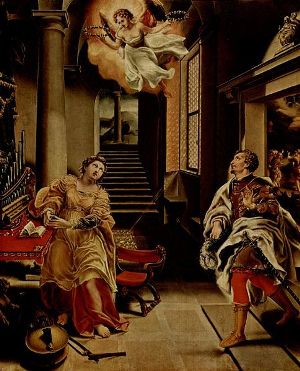
 HRISTMAS IS a time in which music plays a universal role. It is deeply important for those who are devoutly religious and for those who are not. Music touches all of us who are struggling with our own faith.
HRISTMAS IS a time in which music plays a universal role. It is deeply important for those who are devoutly religious and for those who are not. Music touches all of us who are struggling with our own faith.
The birth of Christ recalls a specific time and place as does the music of Christmas. It is sacred music that has poured out into an increasingly secular world. This is a wonderful opportunity and with it comes a special call of service.
Saint Cecilia is the patroness of sacred music and, as such, holds a special place in the hearts of musicians. “He who sings prays twice” is a saying often attributed to Saint Augustine. There is reason to believe that Augustine may not have written those exact words, but he did write, “Singing belongs to the one who loves.”
Music has a unique way of lifting our spirits and making us happy. It is evocative and stirs up memories and experiences from earlier times and places. Singing has the power to unite and to create harmony out of diversity. And song is a gift from God — an expression of his love for us. How do we acknowledge such a gift? By singing. We sing praise to God as a way of expressing our gratitude and love.
In addition to making music that is pleasing to the ear, music ministers are called to serve the community by fostering prayer. In service of the liturgy, sacred music is not simply for ephemeral pleasure (although one hopes it is pleasing!) but for transformative healing and enduring growth. This holds true both for the individual and the community. This is our hope — this is our call.
For when we enter the doors of our churches one never knows what pain, suffering, grief or burdens those among us carry. This is the beauty and the gift of community. When we are unable to pray — when we are distracted, or burdened, or overcome with grief — the community carries us along; the community buoys our spirit and sustains us; the community prays on our behalf. Our voices raised in prayer each week can provide comfort and solace to our brothers and sisters in need. Our very presence at liturgy, along with our spoken and sung prayer, have untold effects on others and can act as a lifeline in ways which we will never know.
For with the birth of Christ comes not only the baby Jesus, but justice, peace and our very Salvation. For this we shout for joy, singing a new song unto the Lord! (Psalm 98)
A cry from deep within our being, music is a way for God to lead us to the realm of higher things. — St. Augustine, Epistoia 166, De origine animae hominis

COMMUNION PROPER FOR EPIPHANY:
* * Free Download:
PDF • Vidimus stellam | Communion Antiphon | Epiphany of the Lord | for Schola, SATB, Organ
Here’s a demo I threw together quickly. I used the piano instead of the organ as I was traveling at the time:
* * YouTube: Rehearsal DEMO
